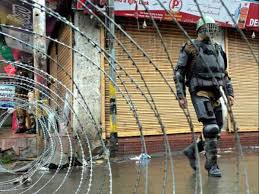Rumours are afloat that the Modi-led government is set to scrap Article 370 and Article 35A of the Constitution, which prevents anyone who is not a state subject of Jammu & Kashmir from purchasing property and settling in the state. The rumours were triggered by reports of Centre deploying additional 10,000 paramilitary troops to address the likely fallout from the removal of the controversial Article 35A in J&K. The government has, however, said that these are precautionary measures in view of terrorist threats.
The rumours reflect apprehensions in the Valley following Home Minister Amit Shah’s pointed statement in Parliament that Article 370, which deals with the special status of J&K, was “temporary in nature” and “not permanent”. While Jammu wants the provision to be scrapped from the Constitution, Kashmir valley-centric parties, across the board, warn that tampering with the special provision would stir the hornets’ nest and the fallout would be difficult to handle.
What is Article 370 and 35A? Are they amendable? If abrogated can it solve the long standing political dispute in Jammu and Kashmir?.
Here’s an explainer on Article 35A and 370
Article 370 grants an autonomous status to J&K, while Article 35A, incorporated into the Constitution in 1954, provides special rights and privileges to the citizens of the state.
What the two articles mean:
Article 370
History
In October 1947, the then-Maharaja Hari Singh of Kashmir signed the Instrument of Accession, which specified three subjects on which Jammu and Kashmir would transfer its powers to the government of India: 1. Foreign affairs, 2. Defence and 3. Communications. In March 1948, the Maharaja appointed an interim government in the state, with Sheikh Abdullah as the prime minister. In July 1949, Sheikh Abdullah and three other colleagues joined the Indian Constituent Assembly and negotiated the special status of J&K, leading to the adoption of Article 370. The controversial provision was drafted by Sheikh Abdullah.
What are the provisions of Article 370?
Parliament needs the Jammu & Kashmir government’s nod for applying laws in the state — except defence, foreign affairs, finance, and communications.
The law of citizenship, ownership of property, and fundamental rights of the residents of Jammu & Kashmir is different from the residents living in rest of India. Under Article 370, citizens from other states cannot buy property in Jammu & Kashmir. Under Article 370, the Centre has no power to declare financial emergency.
It is important to note Article 370(1)(c) explicitly mentions that Article 1 of the Indian Constitution applies to Kashmir through Article 370. Article 1 lists the states of the Union. This means that it is Article 370 that binds the state of J&K to the Indian Union. Removing Article 370, which can be done by a Presidential Order, would render the state independent of India.
Temporary provision or not?
A petition filed by Kumari Vijayalakshmi Jha challenged the validity of Article 370 against the Delhi High Court’s April 11, 2017 order. The petition had said that the continuance of the temporary provision of Article 370 even after dissolution of Constituent Assembly of J&K, and that of J&K Constitution, which has never got the assent of the President of India or Parliament or the government of India, “amounts to fraud on the basic structure of our Constitution”.
Article 35A What is it?
Article 35A gives the Jammu & Kashmir Legislature full discretionary power to decide who are ‘permanent residents’ of the state. It gives them special rights and privileges regarding employment with the state government, acquisition of property in the state, settling in the state, and the right to scholarships and other forms of aid that the state government provides. It also allows the state legislature to impose any restrictions upon persons other than the permanent residents regarding the above.
To guarantee these special rights and privileges, the Article says no act of the state legislature that comes under it can be challenged for violating the Constitution or any other laws.
What will happen if Article 35A is repealed?
Repealment of Article 35A by the Supreme Court of India or by the government will have some far-reaching implications. Before Article 25A was introduced to the Constitution of India, the Governor and the Chief Minister of Jammu and Kashmir were addressed as the Sadr-e-Riyasat (President) and Wazir-e-Azam (Prime Minister). There’s a possibility that if Article 35A is repealed, it would lead J&K back to the same arrangement.
The jurisdiction of the Supreme Court and the Election Commission of India would also be curtailed. The legal control of the Centre over Jammu and Kashmir would be limited only to the matters of Defence, External Affairs and Communication.
Which parties are against the removal of Articles 35A and 370
All regional parties of the state, including the National Conference (NC), Peoples Democratic Party (PDP), Jammu and Kashmir People’s Movement (J&KPM) and others are opposed to any tinkering with Articles 35A and 370 that give a special status to J&K. The Congress party also wants these articles to be protected. Congress leaders maintain that senior leaders of the party, including late Prime Minister Jawaharlal Nehru had painstakingly worked out J&K’s relationship with India through promises made in these articles. Former Jammu and Kashmir chief minister Mehbooba Mufti has warned the Centre against the revocation of Article 35A, saying any tinkering with the constitutional provision would be akin to setting a powder keg on fire. Mufti asked her party workers to get ready for a big fight for the protection of Article 35A, which gives special rights and privileges to the state’s permanent residents.
“We want to tell the central government that tinkering with Article 35A will be akin to setting a powder keg on fire,” the PDP president said. “If any hand tries to touch Article 35A, not only that hand, but that whole body will be burnt to ashes.”
Mufti said they would fight till death any attempt to tinker with the state’s special status.
Who wants Articles 35A and 370 removed?
Among the centrist mainstream parties, the Bharatiya Janata Party (BJP) stands for abrogation of these articles arguing they are roadblocks not only to the integration of the state with the rest of the country but also in the development of J&K.
Article 35A, which provides special rights and privileges to the citizens of Jammu & Kashmir, was incorporated in the Constitution of India in 1954 by an order of then President Rajendra Prasad, on the advice of the Jawaharlal Nehru Cabinet. It gives the J&K legislature full discretionary powers to decide who ‘permanent residents’ of the state are. It also gives them special rights and privileges in employment with the state government, acquisition of property in the state, settling in the state, and the right to scholarships and other forms of aid that the state government provides. It also allows the state legislature to impose any restrictions upon persons other than the permanent residents regarding the above.
To guarantee these special rights and privileges, the Article says that no act of the state legislature that comes under it can be challenged for violating the Constitution or any other laws.
Text of Article 35A
“Saving of laws with respect to permanent residents and their rights.” — Notwithstanding anything contained in this Constitution, no existing law in force in the State of Jammu and Kashmir, and no law thereafter enacted by the Legislature of the State:
(a) defining the classes of persons who are, or shall be, permanent residents of the State of Jammu and Kashmir; or
(b) conferring on such permanent residents any special rights and privileges or imposing upon other persons any restrictions as respects —
(i) employment under the State Government;
(ii) acquisition of immovable property in the State;
(iii) settlement in the State; or
(iv) right to scholarships and such other forms of aid as the State Government may provide, shall be void on the ground that it is inconsistent with or takes away or abridges any rights conferred on the other citizens of India by any provision of this part.






